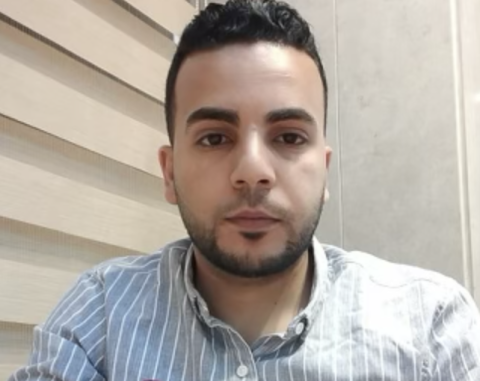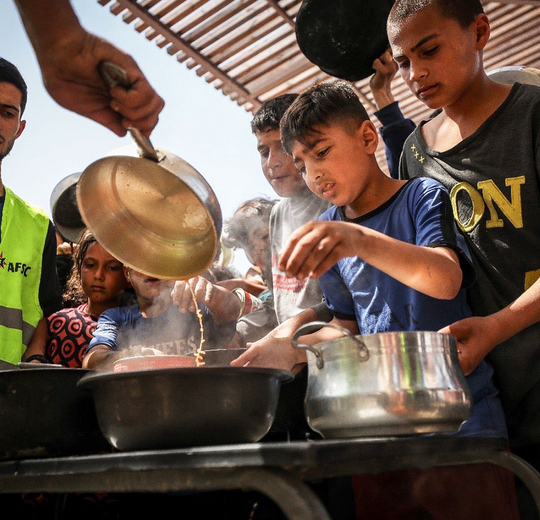My name is Ali Alowisi, and I am 29 years old. My mother dreamed of traveling and undergoing kidney transplant surgeries. My mother tried her best to be patient, believing that she might be able to travel soon, live her life normally, and overcome the disease, but she died complaining to God about the injustice of the occupation and the world's abandonment of the suffering of patients in Gaza.

My name is Ali al-Owisi, and I am 29 years old. My mother spent her last days in great agony. She’s spent the last two years unable to walk, and fell into a coma for a week before dying, affected by kidney failure and cancer. Her pain increased, with no painkillers or medications to alleviate her suffering. She couldn’t eat, so we fed her through medical injections. These are my mother’s final days.
My mother’s name was Raghdah Ali al-Owisi. She lived to be 71 years old, and was born in the city of Rafah in the southern Gaza Strip. But her family was from the town of Zarnouqa, which was occupied in 1948. She married my father, Hassan al-Owisi, at the age of 24 and gave birth to three sons, Fadi, Ibrahim, and me, Ali, and three daughters, Huda, Maha, and Asma. She was a grandmother to 20 grandchildren and lived with them in the Nuseirat refugee camp in the middle of the Gaza Strip, where our family home was located. Our lives were happy with our parents.
In 2021, after many rounds of medical examinations, we discovered my mother suffered from kidney failure. We tried every possible way to treat her. The doctors prescribed weekly kidney dialysis sessions at the Al-Aqsa Martyrs Hospital in the city of Deir al-Balah in the middle of the Gaza Strip.
At the beginning of her illness, the doctors prescribed three weekly kidney dialysis sessions, each lasting for four continuous hours. My mother endured it, trying to hide her pain from us, but the pain was too great to hide or for her to bear. I had never seen my mother cry before. Among us, she lived a happy, peaceful life, but during her illness, I saw her tears many times. The pain and suffering took all her energy.
My mother dreamed of traveling and undergoing kidney transplant surgeries. We all agreed to donate a kidney to her if we could. My mother tried her best to be patient, believing that she might be able to travel soon, live her life normally, and overcome the disease. Dialysis sessions began with high spirits and great faith in a complete and quick recovery.
A year after starting the kidney dialysis sessions, my mother’s health deteriorated, and she became unable to walk. We were forced to transfer her to the hospital in an ambulance dedicated to kidney dialysis. My brothers and I took turns leaving our work so that one of us could accompany our mother to each kidney dialysis session.
The process of transferring my mother to the hospital for kidney dialysis required great effort. My mother lived on the first floor of our house and couldn’t walk. We worked together with the ambulance driver, the nurse, and the neighbours to lift my mother and transfer her to the ambulance and back to the first floor after each kidney dialysis session. We hoped that our mother would recover with treatment and that the treatment would alleviate her pain.
My mother remained committed to her kidney dialysis sessions at the Al-Aqsa Martyrs Hospital until the Israeli war on Gaza broke out on the seventh of October, 2023. After thousands of families were displaced from Gaza City and the northern governorate of the Strip, the number of kidney patients in the dialysis department at the Al-Aqsa Martyrs Hospital increased significantly, greatly affecting my mother and all the other patients.
The kidney dialysis department has 22 kidney dialysis machines, some of which are out of order and not functioning. The department provides medical services to 140 kidney failure patients from the central governorate of the Gaza Strip. However, during the war, the department began providing services to 480 patients after many residents in Gaza were displaced.
The pressure from the large number of patients on the kidney failure department exceeded the hospital’s management capabilities. The hospital administration appealed daily to international institutions and the international community to provide kidney dialysis machines to save the lives of kidney failure patients in the Gaza Strip, but their calls and pleas went unanswered.
In early January 2024, Israeli forces stormed the camps in the middle of the Gaza Strip including the one we lived in, the Nuseirat camp, and we were forced to flee to Rafah city to my uncle’s house. We couldn’t afford an ambulance to transport my mother, and they were all occupied anyway transporting the wounded and the martyrs. We transported my mother in a car.
We were staying about 60 kilometres [37.2 miles] away from Rafah city, only a half an hour away. But I felt the distance was hours longer. My mother’s moans and cries of pain never stopped due to her deteriorating health condition and her uncomfortable sleeping position in the car. But we had no choice. The shelling reached all areas in the Nuseirat camp, and we fled with my mother out of fear of death.
My uncle’s house is in the Saudi neighbourhood west of Rafah city, and the Abu Yousef Al Najjar Hospital, which has a kidney dialysis department, is located in the eastern areas of Rafah city. Since we couldn’t afford an ambulance to transport my mother, we transported her in a private car at our own expense, which cost us between 200 and 300 shekels for each kidney dialysis session.
The kidney dialysis department at this hospital was small and overcrowded with patients. The majority of kidney failure patients in the Gaza Strip now undergo dialysis there, as it is the only hospital still operating in the southern Gaza Strip. The department lacked cleanliness due to the harsh war conditions that destroyed the healthcare system in all governorates of the Gaza Strip.
We stayed in Rafah city for a month, but after the occupation withdrew from the camps in the middle of the Strip, my mother insisted we return to our home in Nuseirat camp. The journey back home was like continuous torment. My mother’s pains never stopped, and her tears never ceased.
We cried with my mother every time. She cried from pain and agony, and we cried from our helplessness and inability to provide assistance, medication, or relieve her pain. My mother suffered all the time, and our hearts were crushed with pain. This is our mother whom we love dearly, whom we do not want to lose, and who loves life and wants to continue it with us in good health. However, the occupation had a different idea. The war created a harsh reality for the patients of Gaza.
My mother’s health deteriorated after our return to the Nuseirat camp. She couldn’t even enter the bathroom. There was no electricity or water for more than six months in Gaza. My mother wore diapers. We bought painkillers even if we could only find them at high prices, but they did not save her life.
During Ramadan of this year, doctors discovered that my mother had cancer in her abdomen and the lower part of her body. This filled us with extreme fear and panic. My mother’s body couldn’t resist kidney failure, so how would she cope with the deadly cancer as well? We didn’t tell her for fear of upsetting her. We told her that the pain in her abdomen and lower body was due to the complications of kidney failure.
She fell into a coma for a week, and we couldn’t find a place for her in the hospital. Our mother remained in a coma at our home for a week. The doctors took turns checking on her, but my mother died at home, affected by her kidney failure that lasted for three years and the cancer we discovered a month before her death. My mother died on Wednesday, 29 May 2024, due to the occupation’s unjust policy towards patients in Gaza, depriving them of their right to treatment, destroying the healthcare system in the Strip, and causing the deaths of dozens of patients due to oppression, pain, and deprivation of treatment.
We couldn’t find enough space in the cemetery to bury my mother, so we dug up my grandmother’s grave and buried my mother in the same grave. There is no space in the cemetery to bury our deceased due to the large number of martyrs who have fallen during this war. My mother responded to treatment before the war broke out, but the war reset her health to zero. Physical therapy sessions and painkillers failed to relieve her pain and agony. She suffered greatly for more than six months during the war. My mother died complaining to God about the injustice of the occupation and the world’s abandonment of the suffering patients in Gaza
Take Action Now
Tell Congress to demand lifesaving aid for Gaza
The humanitarian crisis in Gaza has reached catastrophic levels. Since March 2, 2025, Israel—with full support from the U.S.—has severely restricted food, water, medicine, and humanitarian aid from entering Gaza.
Contact
If you have questions or concerns, please contact us at gazaunlocked@afsc.org.

